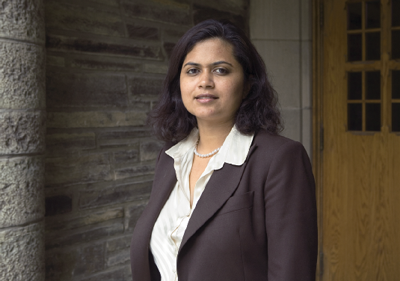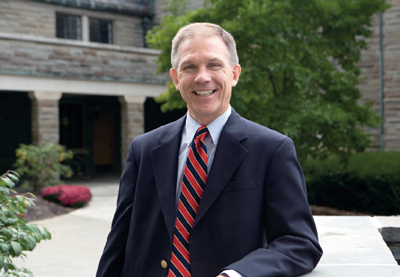 The Law School's Asylum Clinic Helps Deportees who face torture and death in their native countries.
The Law School's Asylum Clinic Helps Deportees who face torture and death in their native countries.
 THE LAW SCHOOL'S ASYLUM CLINIC HELPS DEPORTEES WHO FACE TORTURE AND DEATH IN THEIR NATIVE COUNTRIES
THE LAW SCHOOL'S ASYLUM CLINIC HELPS DEPORTEES WHO FACE TORTURE AND DEATH IN THEIR NATIVE COUNTRIES
From the outside, the Lackawanna County Prison looks like a medieval castle sprouting out of a middle school. It has a turreted stone tower—part of the original 1890s building—but the bulk of the long, low facility is made up of institutional-looking tan panels, with occasional splashes of brown brickwork and bright red trim around the windows and doors. In the lobby, the rows of plastic chairs recall an airport departure lounge—except for the bulletproof glass around the reception desk, and the metal detectors, and the lockboxes where visiting law enforcement officers stow their guns before entering the cellblocks.
Law professor Sital Kalantry '94 is here on a Friday in September, clad in a pantsuit, two students in tow. On the two-hour drive from Ithaca to northeastern Pennsylvania, she and third-year JD student Lisa Newstrom had described their case to Gauri Subramanium, a master of law candidate newly arrived from India. Their client, a forty-seven-year-old man named Emmanuel who suffers from heart problems and high blood pressure, desperately wants to avoid being sent back to his native Haiti, where he'll likely be thrown into prison simply for being a deportee. "Conditions have been compared to slave ships," Newstrom had said, glancing at Subramanium in the rear-view mirror as she navigated Interstate 81. "There's not enough room to lie down. The food is just thrown in, and only the strong survive. It's not just possible that he's going to suffer and die in there—it's absolutely inevitable."

Kalantry runs Cornell's Asylum and Convention Against Torture Appellate Law Clinic, which provides pro bono representation for immigrants claiming that deportation to their native countries will subject them to persecution, torture, rape—and even death. Founded in 2003 and held each spring, the for-credit clinic has taken on twenty cases involving immigrants with a wide variety of backgrounds: a former Ugandan child soldier; a Dominican man who feared retaliation for testifying against drug dealers; a woman who was raped and saw her family murdered during the Somalian civil war; a Brazilian who had battled police corruption back home. "These are life-changing situations," says Professor Stephen Yale-Loehr '77, JD '81, who co-teaches the clinic with Kalantry. "If we win, the person will be able to stay in the United States; if we lose, they'll be deported and could be killed in their home country. We try to get the students to know their clients and sympathize with them—but also realize that as lawyers, there's only so much they can do."
The asylum clinic is highly sought-after by law students; it takes on four cases each spring, with two students assigned to each. Their success rate for appeals, Kalantry says, is about 50 percent— well above the rate for deportation cases in general, in which the immigrant is granted asylum just 7 percent of the time if he has no legal representation, and 35 percent if he does. "To actually be writing a brief for a client is much different from doing a simulation exercise—it's real," says Matt Faiella, JD '05, who worked on the case of a Mexican man who feared police persecution for his association with the Zapatista rebels (which, he claimed, amounted to giving them a ride in his car). "I felt that his safety was in our hands. Doing a good job wasn't just about a grade."
The experience inspired Faiella, who worked as a staff attorney for a federal appellate court in Atlanta after law school, to take his present job with the New York Civil Liberties Union. And though third-year student Kristen Echemendia has signed on with a Manhattan corporate firm, her successful efforts to aid a client who'd been tortured during the Guatemalan civil war made her determined to do pro bono immigration work as well. "Professor Kalantry and Professor Yale-Loehr allowed us to take on so much responsibility," says Echemendia, who is especially sympathetic to asylum seekers because her parents emigrated from Cuba. "I was interviewing my client, drafting affidavits, doing research on country conditions. It was certainly the most rewarding experience I had during law school, and it's one I'm going to carry with me throughout my career."
Most of the time, the student lawyers interact with their clients only by phone or letter; the September immigration hearing is a rare opportunity for an in-person meeting. Because Emmanuel's asylum request was denied by the Board of Immigration Appeals, Kalantry has transferred his case to the Law school's fall-semester International Human Rights Clinic for presentation to the Federal Court of Appeals for the Third Circuit; law student Newstrom has been working with him since he was represented by the asylum clinic last spring.
The prisoner comes in, clad in a khaki uniform. The room is constructed of cinderblocks, but since it's sometimes used for family visits, one wall is incongruously lined with brightly colored toys. There's a bathroom behind the table where the officers sit; the broken toilet is running so loudly it's hard to hear the proceedings.
After a brief wait, Kalantry and the students are waved through the metal detector—purses and cell phones had to be left in the car—and through two heavy metal doors, which can be opened only by guards at the front desk. Their goal: to help Emmanuel convince two immigration officers that, after nearly two years in detention, he deserves to be freed pending his appeal. Also present is a man named Antonio, a member of Emmanuel's evangelical church on Long Island; he has taken the day off from work as a hospital orderly, put on a black pinstripe suit, and driven from New York to speak on Emmanuel's behalf.
The prisoner comes in, clad in a khaki uniform; he's balding and has a white goatee. An orange ID bracelet dangles from his wrist. The room is constructed of cinderblocks, but since it's sometimes used for family visits, one wall is incongruously lined with brightly colored toys. There's a bathroom behind the table where the officers sit; the broken toilet is running so loudly it's hard to hear the proceedings.
Prompted by the immigration officers, Emmanuel explains his history: how he came to the U.S. in 1981, overstaying a tourist visa. He got involved with drugs and the wrong crowd, eventually serving five years for attempted robbery—a charge that stemmed from trying to evade a cab fare from Brooklyn to Queens. Although he was doing well after his release—he had a series of jobs for Target and Kmart—the sudden death of his common-law wife sent him back to drugs, and after his latest prison stint the U.S. government sought to deport him. He'd been held in detention since two days before Christmas 2005, staying in various facilities and once being moved as far as Louisiana on his way back to Haiti before the deportation order was stayed. While previously incarcerated, he'd taken GED classes and studied art and building maintenance; lately, he has dedicated himself to Bible study.

"I learn from my mistakes," he tells the officers. "I'm not getting younger, I'm getting older. I take responsibility for what I have done wrong in the past." They ask him a series of tough questions, leading up to the toughest: since he violated U.S. immigration law by overstaying his original visa, how can they trust him to not to run if he loses his appeal? "I would definitely turn myself in," he says. "If you let me out, I can earn money, so if I have to go home I can buy my own plane ticket. But if you give me one more chance to make everything right, I'll do my best to stay away from bad things. I've been hiding for twenty-seven years, and that's not a right way to live."
Toward the end of the hearing, the officers ask logistical questions about Emmanuel's potential release: If he's freed in Scranton, who'll pay for his bus ticket back to Queens? Can Antonio pick him up? Would someone deposit funds in his prison account? The tenor of the conversation gives Kalantry and her students hope that has them buzzing all the way back to Ithaca—but when the decision comes down a few weeks later, Emmanuel's freedom proves to be dependent on him posting a $14,000 bond. As Kalantry notes in an e-mail: "This is close to impossible, of course."
 The news is disappointing—but those who work in the asylum field have heard far more troubling stories. Take the case of Liana, a woman now in her late forties who asked that her real name be withheld; she came to the asylum clinic in spring 2006, appealing deportation to her native Liberia. The stark facts of her background are laid out in the clinic's written summary: "Uniformed soldiers first sexually assaulted (gang-raped) the client when she was between the ages of five and six. She suffered a similar assault during the same time period by another group of uniformed soldiers. The client suffered a third sexual assault after her family relocated to Sierra Leone. During this incident, the client
The news is disappointing—but those who work in the asylum field have heard far more troubling stories. Take the case of Liana, a woman now in her late forties who asked that her real name be withheld; she came to the asylum clinic in spring 2006, appealing deportation to her native Liberia. The stark facts of her background are laid out in the clinic's written summary: "Uniformed soldiers first sexually assaulted (gang-raped) the client when she was between the ages of five and six. She suffered a similar assault during the same time period by another group of uniformed soldiers. The client suffered a third sexual assault after her family relocated to Sierra Leone. During this incident, the client
was raped in her home by her uncle, a police officer. Further, while in Sierra Leone, the client was forced to undergo female genital mutilation in which she underwent a complete clitorectomy and the stitching together of certain portions of her external genitalia." As a result, the summary notes, "she continues to suffer immense physical and psychological pain to this day including continuing chronic pelvic pain, depression, post-traumatic stress disorder, panic attacks, physical scarring, painful (if not impossible) sexual intercourse, recurring nightmares and flashbacks, and feelings of fear and shame."
In a phone interview from Detroit, where she's now living, Liana declines to discuss the details of her childhood in Liberia; the memories prompt a gush of tears. But she talks at length about the offenses that prompted the deportation order, two check-forgery convictions for which she served a total of three and a half years in prison. "I trusted the wrong people, because I was naïve," she says, attributing her relatively long term of incarceration to public defenders who convinced her to plead guilty. Although she'd been a legal immigrant with a green card, her criminal record spurred the deportation. "The people from Cornell were really sympathetic, because I went through hell," says Liana. "I don't know anybody in Liberia. If I had gone back, I wouldn't have made it, because if you come to the States and tell what happened, you're stoned, you're ridiculed, you're an outcast. My family name alone, because my dad was from a certain tribe, would create problems for me."
But even after winning her case, Liana says, "it hasn't been easy." She has lost several jobs when employers found out about her forgery convictions, and though she's been working as a loan processor for a mortgage company, she has no benefits and little contact with her family. "I'm not a troublemaker," she says. "I'm not trying get in trouble with the law. I'm just trying to live."
Liana spent six months behind bars before being granted asylum; Emmanuel may soon celebrate his third Christmas in detention, as his case waits to be heard by the Third Circuit. Such situations are increasingly common, Yale-Loehr says, due both to post-9/11 fears about terrorism and a general anti-immigration fervor. "People want a crackdown on the border," he says. "They want more people to be detained. We've got 12 million undocumented immigrants in the United States and some Americans think we should round them all up and detain them." In response to public sentiment, he says, Congress has appropriated more money for detention facilities—and increased the number of minor crimes that can get people expelled from the country. "If you or I shoplifted, we'd go to jail and that would be it," he says. "If an immigrant shoplifts a ten-dollar dress, not only will they have to serve time in jail, but they could be deported—even if they're in the United States legally and have had a green card for twenty-five years."
In choosing their clients, Yale-Loehr says, the clinic tends to favor people who didn't have legal representation in their original cases. Kalantry notes that because it's an appellate clinic, its lawyers are limited to facts already on the record that can be the subject of an appeal—so not having had adequate counsel in the first place makes the cases doubly challenging. "Many people don't realize that, unlike in criminal cases, there's no constitutional right to counsel in immigration proceedings," says Yale-Loehr. "But too often in our immigration system, the most complex cases involve the people who can least afford a lawyer."


